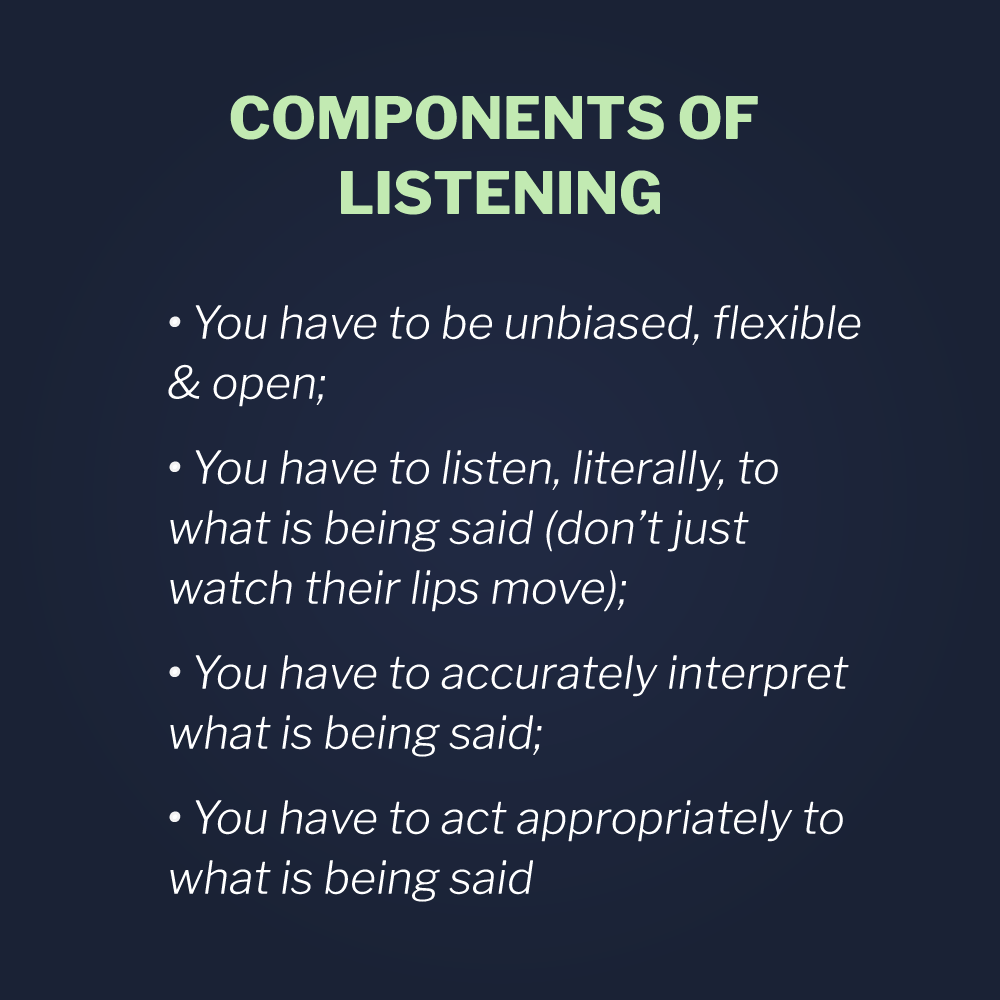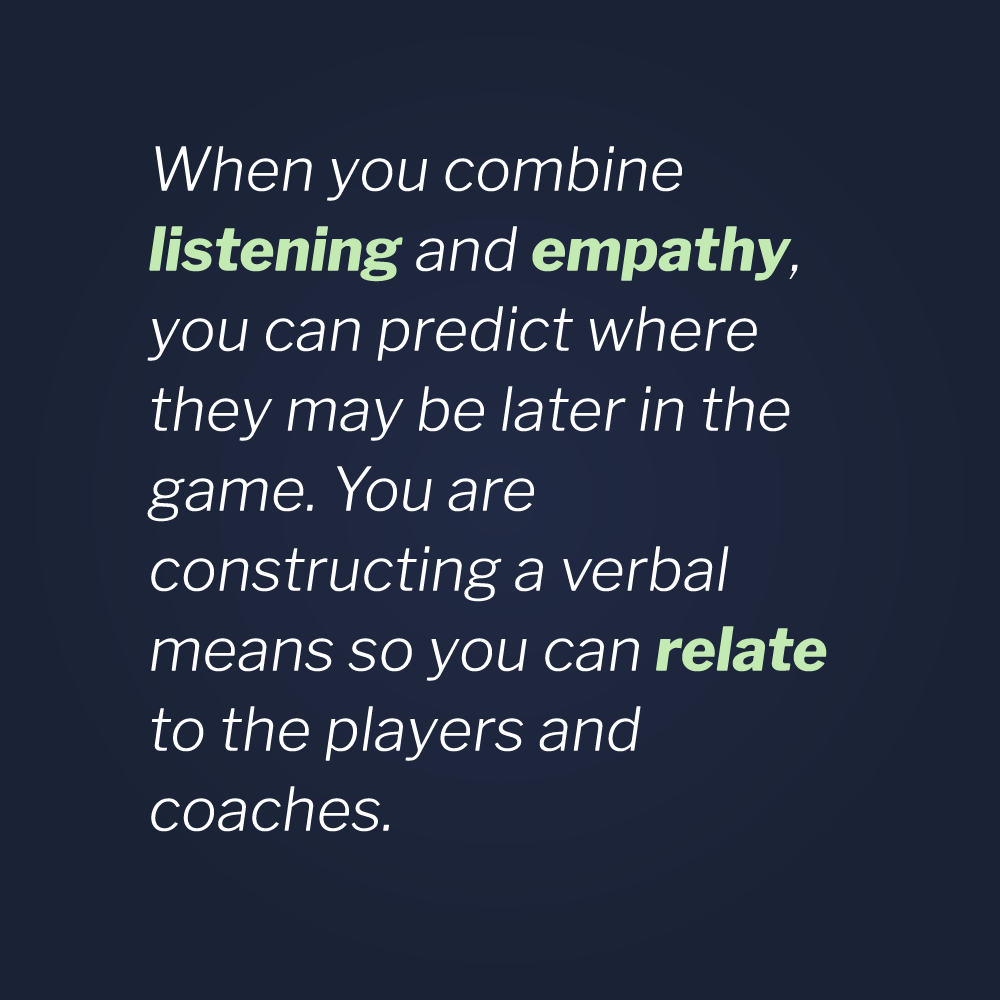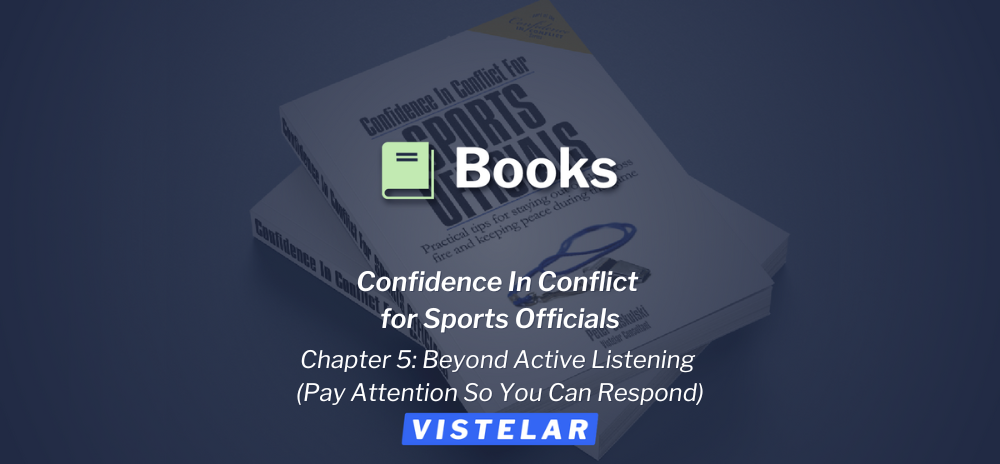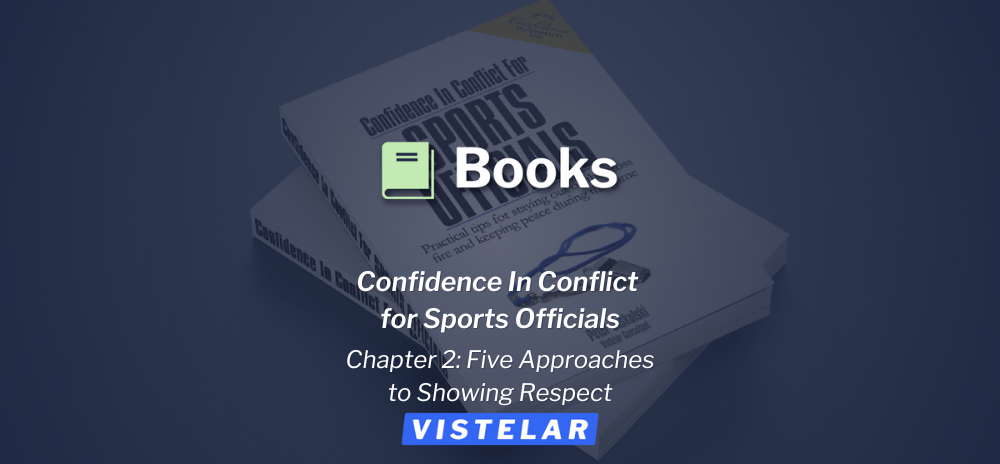Enjoy this excerpt from one of our published books.
Chapter 5
Beyond Active Listening (Pay Attention So You Can respond)
It’s hard for anyone to listen to a person who is yelling at them. It’s even harder for the person in authority to listen to someone who is yelling at them. Let me ask you this question: “What is the opposite of talking?” The answer should be “listening.” But is that what we really do when someone is yelling at us? No, we aren’t listening. We wait to interrupt them so we can say what we have to say, especially if we know and/or think we are right. The challenge for us is to learn how to listen to people so we can effectively communicate with them when they think they have been wronged and they go into crisis mode.
I just referred to players, coaches and fans as going into a crisis mode. Let’s define the word crisis to better understand why players, coaches and fans become emotional during an athletic event. The Webster definition is as follows: a difficult or dangerous situation that needs serious attention. Is being on the wrong end of a decision or call in a game a crisis? For athletes and coaches it can be. For others they say something like, “It’s just a game.” If you really want to set off a competitive person say, “It’s just a game.” I like to think of the word “crisis” in this way: A law enforcement colleague of mine once made this statement, “It was a crisis in their minds.” I like this statement because it tells me that everyone defines their own crisis (a difficult situation that they feel needs serious attention). Don’t coaches and players experience their own crisis during the event? Yes they do. That’s why they get upset. We need to listen to them so we can determine what their crisis really is. Then we can address the issue that put them into the crisis.
Earlier I wrote about Bill Dittmar’s drill called “sounds of the game.” This drill was designed to teach soccer officials how to be aware of everything that goes on during the game. You also have to utilize your other senses. There are things happening during the game or event that need our attention or at least we need to know that they are happening. We may hear things that are said to us or said between players, coaches and the teams. We may also see things that may indicate a problem, things such as physical contact between players, or gestures made between players and coaches. Listening becomes an exercise using other senses than just your hearing.
Let’s take a look at this scenario in a basketball game. You are officiating a high school game between two rivals that have similar records in their conference. This is a “big game” to them. I use this term “big game” facetiously. My umpire partners and I always joke about this term when we hear it from coaches and players in this context: “How can you make a call like that in such a “big game."
If it wasn’t a “big game,” should we make a different call? I don’t think that’s our goal as officials. The coaches and players will also use the term to explain away their bad behavior just because it is a “big game.” Does that mean that we officiate differently in “big games?” The answer would be no, we can’t officiate a game differently just because it is a “big game.” The point here is that people’s perceptions can affect their behavior and we need to understand that. All that hype can lead to tension during the game. As officials we need to maintain our Emotional Equilibrium so we can see and hear the “sounds of the game.” Then we can manage it more effectively.
During the early minutes of a basketball game there are a few hard screens and fouls. The coaches start saying things to each other across the benches. You and your partners see and hear this. What do you do? Let it go and think to yourself: “Wow, this is going to be a rough game,” or are you going to address it? This is a hard concept to teach to officials. When should you intervene? If you remember that the earlier you intervene the less trouble will occur later in the game it will help you keep order. It doesn’t matter what sport you officiate. Tension between players and coaches can happen in any sport. The longer it continues, the greater the chance that something physical is going to happen. Joel Lashley refers to this as “gateway behaviors.” These are the little things that happen early in the game. If we don’t address the behaviors early, they will continue to mount. They may get to a point where the game gets too physical. At this point the damage is done and you may have lost control of the game. You should address the “gateway behaviors” when they happen. That’s why you have to remember to remain alert (listen with all of your senses), make a decision (intervene now) and have a pre-planned, practiced response to deal with the issue.
The Skill of Listening
In order for an official to respond to a coach or player, they have to listen. Listening is a skill. It’s a skill that we need to improve. This is especially true when you are trying to listen to someone who is excited, emotional and maybe out of control. You can gain so much information from listening appropriately. You can then formulate a response that corresponds to what is really bothering the coach or player.
Listening involves the following components: 
- You have to be unbiased, flexible and open;
- You have to listen, literally, to what is being said (don’t just watch their lips move);
- You have to accurately interpret what is being said;
- You have to act appropriately to what is being
All officials need to be unbiased. That’s a major ethical part of officiating. But can we be biased without even realizing it? Sure, it happens. It happens when you start having discussions about player and coach behavior before the start of the game. “I had these guys last week. They whine about every call.” My response would be: “Really? Were they right?” By starting the game with a pre-conceived notion that they “whine,” you are pre-loading yourself to be biased. Yes, we do discuss the behavior of coaches and players. And their behavior at times may be over the top. But we need to be transparent about what caused the behavior. The only way to know what caused the behavior is to be unbiased and listen.
Listening also conveys flexibility and openness. If you don’t lis- ten, you convey rigidity and you lose contact with the players and coaches. Without that contact, you have less of a chance of gaining cooperation with anybody associated with the game.
There are a lot of things that are said by coaches and players during the game. It is important for officials to hear literally what is said so they can act appropriately. Sometimes the best action is no action. It may be appropriate to just let it go.
Listening also includes several other components that are important for your success in communicating with the players and coaches. Pay attention to the words being used. There are cues in these words that will give you an understanding of why they are upset and what may happen next. Some words indicate that there may be physical contact about to occur, and in some cases an assault could be coming your way. The tone of voice also plays an important role in understanding the mindset of the person you are listening to. Is it soft (calmness) or is it loud (frustration/anger)? Pay attention to the person’s facial expression. Does the face indicate anger through tension, frustration or maybe confusion? Is their body language indicating openness, anger through tension or do they flail around, which can indicate frustration and anger? Again, body language can indicate physical contact or an assault is about to occur. It’s something that sports officials must pay attention to.
The context of the situation also needs to be assessed. Are they upset about something that makes no sense at all? In other words, have you made a ruling or call that’s a “no brainer” and they are out there to make a point about something else? I like it when officials talk about coaches that enjoy “working the officials” so they can get a call in their favor. That raises my antenna and amuses me.
When I first began umpiring on the college level, I was tested in a NCAA Division III baseball game. I was umpiring behind the plate and called a few balls on pitches that I saw as low. It was borderline on whether they were a strike or a ball but I was comfortable with calling them balls. I heard this several times from the dugout: “We need that pitch, we teach them to throw that pitch down there.” My answer was: “Teach them to throw it higher.” That felt good when I said it, so it was probably not the right thing to say. This was before I had understood the value of Vistelar’s methodologies. Today my response would have been, “I got that coach, but I have it down in the zone. He needs to bring that pitch up.” We’ll talk about that later when we discuss Redirections. The coach saw me as a new umpire and was testing me. After the game, he walked by my partner and me and stated, “You did alright.”
The final component to listening is to consider the distance the person is from you and the position you are in. Are they talking or yelling from the bench, did they sprint on to the field/court and get into your face? Are you able to position yourself with your back to the benches and crowd (no one else needs to hear what is being said)? Are you able to control the distance and positioning? If not, is it because they keep moving closer or laterally to the left or right? This is an indicator that there is no communicating taking place. The more uncontrolled movement that occurs hinders the ability to communicate. This is the time to act (technical foul, ejection, flag, and any other appropriate sanction).
The Most Important Quality For An Official To Have
Let’s talk about “empathy.” This is the most important quality for an official to have when dealing with people that are in crisis. Empathy is mentally putting yourself into another person’s circumstances to experience it through his or her eyes. Let me share this story with you to explain the importance of empathy.
I was umpiring a high school baseball game between two very good programs with very good coaches. I was the home plate umpire. My partner for this game was a good friend and a good experienced umpire, Dan Deremer. During ground rules, the coaches discussed how their seasons had been going up to that point in the season. The coach from “Team A” expressed his frustration with his team’s inability to score runs.
During the top half of the 5th inning, “Team A” was winning 2 to 1. “Team A” was at bat and had runners on first and second base with one out in the inning. A right-handed hitter from “Team A” hit a hard line drive down the right field line. The ball was tailing slightly toward the right field foul line. The right fielder took a path toward the ball that placed him right on top of the foul line running out toward the right field fence, blocking my view of the foul line. My responsibility on this type of play was to rule fair or foul and to cover home plate. Therefore I took a few steps in front of home plate, on top of the foul line between home and first base. Here’s what I was thinking: “Crap, I can’t see the foul line!” I had a 50% chance of getting it right based on my judgment of where the ball might hit.
The ball, which was tailing slightly, hit the ground and instantly bounced over the right field fence. I immediately put my hands up and emphatically called “foul.” The right fielder, at the same time I called foul, held his hands up indicating that the ball bounced over the fence for a ground rule double. In other words, I called a foul ball and the right fielder told everyone it bounced over the fence, fair.
Has this ever happened to you? I instantly felt my stomach drop. I was overwhelmed with a feeling of indecision. Time stopped in my mind. I thought, “Oh my God. Did I just kick this call?” The coach from “Team A” came down the third baseline from the coach’s box and began to express his displeasure with my call. I met him up the third base line and thought: “I would be doing the same thing you are doing.” That’s empathy! He did not say or do anything that warranted an ejection. I just let him go for about 30 seconds, and then said the following: “Ernie, can I tell you what happened? I couldn’t see the foul line because the right fielder was right on the line. I made an educated guess based on the trajectory of the ball. I know how you feel and I’d be out here too if I was in your shoes. But there’s nothing I can do to change the call (I can’t go by the fact that the right fielder did what he did so the ball must have been fair).”
The coach began listening to me. He was standing, looking at the ground with his hat in his hand. He said a few more things trying to figure out what just happened and then he returned to the coach’s box. I went behind home plate and I thought: “Please God, let this kid get a hit.” He didn’t get a hit and the inning ended with “Team A” not scoring a run. My foul ball call cost them at least one run in a 2 to 1 game.
The inning ended and the coach came by me as he entered his dugout and said, “That was such a big call, couldn’t you have asked your partner?” The answer to that was no, Dan was in no position to see the ball hit the ground either foul or fair. As I was cleaning off home plate to begin the bottom half of the inning, the coach from Team A came out of the dugout and said to me: “Pete, I have a parent who was sitting on the right field foul line. He said the ball was clearly foul.” I got it right! I looked up from a bent over position and said: “Thanks Ernie, you have a lot of class.”
First of all, this story could and probably has happened to other umpires. There are other umpires that probably would have handled it like I did. The teaching points here are important. There was a lot of respect that was exhibited on that field, a respect that was cultivated through previous interactions with these coaches.
My empathy was genuine and it showed him respect. He returned the respect by listening to me and by telling me I had gotten the call right. This could have gone really bad. I could have been rigid and not listened to him when he came out to argue. I know some umpires that may have told him to go back to the coach’s box. This could have made the situation worse, which may have caused the coach to escalate his behavior, which may have led to an ejection. By the way, the game ended with “Team A” winning 2 to 1.
Listening + Empathy
By utilizing the skills of listening and mastering the tactic of empathy, you are well on your way to managing your communication with the players and coaches. By listening you are gaining intelligence on where the players and coaches are at that moment. You can use that intelligence to gain cooperation. By exercising empathy you find out where they have been in the past. You are seeing the situation through their eyes. The past means earlier in the game and in their previous games. When you combine listening and empathy, you can predict where they may be later in the game. You are constructing a verbal means so you can relate to the players and coaches. Empathy doesn’t mean agreeing with them. It means you are simply trying to understand their perspective.
your communication with the players and coaches. By listening you are gaining intelligence on where the players and coaches are at that moment. You can use that intelligence to gain cooperation. By exercising empathy you find out where they have been in the past. You are seeing the situation through their eyes. The past means earlier in the game and in their previous games. When you combine listening and empathy, you can predict where they may be later in the game. You are constructing a verbal means so you can relate to the players and coaches. Empathy doesn’t mean agreeing with them. It means you are simply trying to understand their perspective.
For example, there are games played in which calls may seem to be going the wrong way for a particular team. The perception is that the officials are not consistent with their calls — too many fouls in a basketball game, too many walks in a baseball game or too many fouls called in a soccer game. The coach or players become upset over a particular call (even though the call was correct). You explain your reason for the call and the games goes on. You listened and you heard what they said. You show empathy by understanding why they may be upset. You can almost predict what’s going to happen on the next close or controversial call. Remember that in order to communicate properly you want to respond and not react. Being able to predict what is going to happen when you make a call allows you to plan your response. When you have a pre-planned response, you look and sound good.
There are times when you may need to ask questions when you talk to a coach or player who is upset. There are several types of questions that can be asked. They range from fact-finding questions, opinion-seeking questions and leading questions that are all not generally applicable in the situations that occur in sports. The questions that officials may ask are either general or direct questions.
I find that in most instances, officials ask questions to clarify what players and coaches are saying. Questions such as, “Coach, what did you see on that call?” A question like this allows you to understand why the coach came out and it helps you to formulate a response that addresses the reason they are questioning a call. There are times when people in crisis say things that they don’t mean. Words fly out of their mouth but the real meaning lags behind. We have to clarify what their meaning is by asking questions. Therefore, another type of question would be, “So coach, you came out here because you thought he missed the tag?” They may modify their answer. Now you have the right reason that they came out to argue the call.
How much Listening Should You do as an official?
I have talked about listening and how important it is to show respect to the players and coaches (as long as it doesn’t reach the level of inappropriate words and behavior). The question I am often asked by new officials is: “How much do you listen?” “When is it time for the officials to talk? You can’t stand there all game and wait for them to stop talking.”
The best way to interrupt a player or coach appropriately is to paraphrase what they are saying to you. You are putting what you perceive to be the meaning of their words into your words. You can then both understand what is being said. If you misinterpret what they were saying, they may well modify what they are trying to say to you. Now you will have the right message so you can respond appropriately.
Paraphrasing also allows you to interrupt without generating resistance from the player or coach you are talking to. Once you repeat what they are saying back to them they will begin to listen to you. This happens because no one will listen harder than to their own point-of-view. This also creates empathy. They will begin to believe that you are trying to understand what made them upset.
Here is an example of using a paraphrase to interrupt. “Coach, let me try and understand what you are saying.” Now you can follow-up with their perceived meaning in your words. “You are saying that you think he traveled before the foul was committed?” The coach can now affirm what you said or he or she can modify their statement. In any case, you have begun to create empathy and have shown respect by listening.
The final component of Beyond Active Listening is to summarize your calls or decisions when it is appropriate. Summarizing creates decisiveness and reinforces your authority as an official. You don’t lose authority when you communicate during the game. Just don’t wear your authority on your forehead by being overly aggressive. It also helps to reconnect communication if for some reason there is a temporary interruption in the discussion. You also want to make sure everyone involved in the discussion understands the outcome. This will help you later when reports need to be written or there are inquiries from other people who have regulating authority over your sport (suspensions, protests or other issues).
Chapter 5 Learning Points
- The opposite of talking should be listening. But for people who have a point to make in a discussion, the opposite of talking becomes “waiting to interrupt” that person so we can tell them what we This is especially true for people in positions of authority, such as sports officials. Listening shows respect, so train yourself to be a good listener.
- Empathy is a powerful tool. It is mentally putting you into another person’s circumstances to experience it through their eyes. Make sure you don’t just empathize, but also demonstrate your empathy through your words and non-verbal gestures. You can do this by using techniques such as making eye contact with the person and nodding your head in understanding. You can also use words such as “I understand what you are saying” and “I hear what you are saying.”
- Paraphrasing is repeating back what the person is saying to you in your own words. This allows you to interrupt the person without them becoming angry or frustrated. This is because they will listen to what you are saying because it’s what they are saying. Paraphrasing helps to convey empathy and it clarifies an understanding of what is causing the conflict.
- When you have discussions with players and coaches and the time allows the discussion, you must summarize your This creates decisiveness on your part. It also shows your competence and assertiveness in managing the game. By summarizing, you are making sure that they understand the call or decision you made. If you don’t fill in the blanks of your decision, they will fill them in for you, which will create more confusion.








